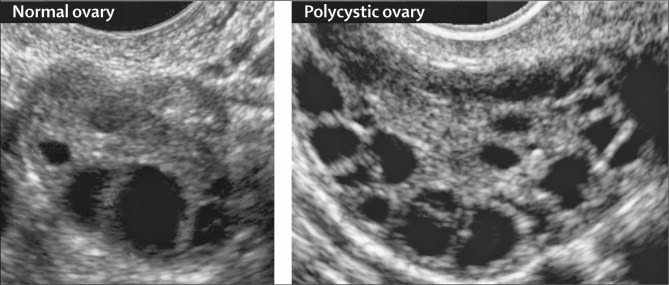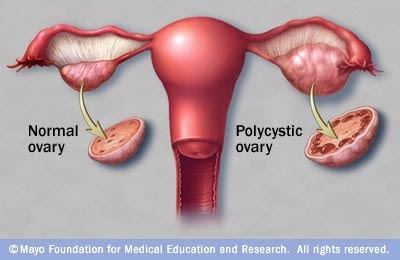PCOS, or Polycystic Ovarian Syndrome, is a common endocrine disorder that affects one in ten female-bodied people. It is often mistaken for a reproductive disorder, but it isn't. In fact, while most people with PCOS have polycystic ovaries, not all do. Also, there are people with polycystic ovaries that do not have PCOS. That's why there is a huge push to change the name of PCOS, because it is a misnomer. While 5% to 10% of female-bodied people have PCOS, they are often misdiagnosed, or told to go to a psychiatrist for their physical and depressive issues. Women (and other female-bodied people) are often not taken as seriously as men in the field of medicine, in fact there are some doctors who still diagnose women with "hysteria," a bogus diagnosis that means the doctor doesn't care about his patients enough to diagnose them with their real problem. Only women had "hysteria." The diagnosis of hysteria was most commonly used in Victorian times, and was cured by an involuntary hysterectomy, or by a doctor massaging a woman's genitals until she has an orgasm, dubbed a "hysterical paroxysm." Another way to cure hysteria was for the doctor to spray a high power cold water jet onto her genitalia, or he'd use a vibrator, aka "massager," on the woman to give her an orgasm. These "cures" would be considered sexual assault today, in Western countries. But, I digress.
The diagnosis criteria are not agreed upon, and right now there are three different diagnostic classification systems: the NIH Criteria, the Rotterdam Criteria, and the Androgen Excess and PCOS Society Criteria.
The NIH Criteria, created in 1990, means a woman must have all of the following symptoms for a diagnosis of PCOS.
1) oligoovulation, meaning infrequent or irregular ovulation.
2) signs of the male hormone androgen in excess (clinical or biochemical)
3) exclusion of other disorders that can result in menstrual irregularity and hyperandrogenism (androgen excess)
The Rotterdam Criteria was established in 2003, and a woman needs to have at least two of the following three criteria:
1) oligoovulation and/or anovulation (infrequent or irregular ovulation and/or no ovulation)
2) excess androgen activity
3) polycystic ovaries (by gynecologic ultrasound)
4) Other entities are excluded that would cause these.
To meet the Androgen Excess PCOS Society, in 2006, came up with criteria in which a woman has to have every symptom to make the diagnosis of PCOS:
1) excess androgen activity
2) oligoovulation/anovulation and/or polycystic ovaries
3) exclusion of other entities that would cause excess androgen activity
This doesn't mean that these are the only symptoms of PCOS. PCOS is a complex syndrome with no clear cause. Here is a list of some of the more common PCOS symptoms:
 |
| Normal Ovary vs Polycystic Ovary |
The diagnosis criteria are not agreed upon, and right now there are three different diagnostic classification systems: the NIH Criteria, the Rotterdam Criteria, and the Androgen Excess and PCOS Society Criteria.
The NIH Criteria, created in 1990, means a woman must have all of the following symptoms for a diagnosis of PCOS.
1) oligoovulation, meaning infrequent or irregular ovulation.
2) signs of the male hormone androgen in excess (clinical or biochemical)
3) exclusion of other disorders that can result in menstrual irregularity and hyperandrogenism (androgen excess)
The Rotterdam Criteria was established in 2003, and a woman needs to have at least two of the following three criteria:
1) oligoovulation and/or anovulation (infrequent or irregular ovulation and/or no ovulation)
2) excess androgen activity
3) polycystic ovaries (by gynecologic ultrasound)
4) Other entities are excluded that would cause these.
To meet the Androgen Excess PCOS Society, in 2006, came up with criteria in which a woman has to have every symptom to make the diagnosis of PCOS:
1) excess androgen activity
2) oligoovulation/anovulation and/or polycystic ovaries
3) exclusion of other entities that would cause excess androgen activity
 |
| Polycystic Ovary vs Normal Ovary |
This doesn't mean that these are the only symptoms of PCOS. PCOS is a complex syndrome with no clear cause. Here is a list of some of the more common PCOS symptoms:
- High blood pressure
- Insulin resistance
- High cholesterol
- Type 2 diabetes
- Heart disease
- Endometrial cancer
- Breast cancer
- Ovarian cancer
- Uterine cancer
- Extensive coronary artery disease
- Heart attack
- Acne, often severe
- Hirsutism (HER-suh-tiz-um) increased hair growth on the face, chest, stomach, back, thumbs, or toes
- Weight gain
- Problems with ovulation
- Infertility because of lack of ovulation
- Infrequent, absent, and/or irregular menstrual periods
- Multiple, small cysts in the ovaries
- Oily skin or dandruff
- Weight gain or obesity, usually extra weight around the waist
- Male-pattern baldness or thinning hair
- Hyperadrogenism (an excess of male hormones)
- Chronic unopposed estrogen secretion
- Acanthosis nigricans (patches of skin on the neck, arms, breasts, or thighs that are thick and dark brown or black)
- Skin tags (excess flaps of skin in the armpits or neck area)
- Pelvic pain
- Anxiety
- Depression
- Sleep apnea
- Preeclampsia during pregnancy (pregnancy induced high blood pressure)
- Gestational diabetes
- Decrease in breast size
- Deeper voice
- Repeat miscarriages
- Enlargement of the clitoris
 |
| Normal Ovary vs Polycystic Ovary |
As you can see, PCOS causes a myriad of symptoms. Some people's lives are greatly affected by it, while for others it's just a nuisance. While we wait for doctors to reach a conclusion about the cause of PCOS, we also wait for the cure.
I was suffering from Polycystic Ovary Syndrome (PCOS) since my 19 years of age. Ever since i got married i have not been able to get pregnant, so i was completely barren due to this genetic disorder. I was prescribed several Clomid Meds but couldn't see any improvement. I would basically go from one outbreak to the next. Finally, on my best friend's recommendation, i decided to try the rescue herbal remedy which are made in liquid form with natural root and herbs from Dr Molemen.Within a few weeks, I could see improvements in the symptoms.
ReplyDeleteMy Menstrual Period has been maintained to normal,I used this medicine for two weeks and after some months later i began to have some early symptoms of pregnancy, its been over a year and some months now since i used that medicine and i have successfully given birth to a child,after been childless for many years due to this PCOS Syndrome. I would recommend this medicine to my other friends out there who are suffering from PCOS to give this medicine a try.
contact : drmolemenspiritualtemple@gmail.com) or (dr.molemenspiritualtemple@yahoo.com) or call him +2347036013351.
Polycystic Ovary Syndrome (PCOS) is a hormonal disorder in women, which is caused by high levels of male hormones. Oral contraceptive pills, Spironolactone, and Clomid are some of the medications used in the treatment of PCOS. Common PCOS Symptoms include irregular periods, infertility problems, excess facial hair, high cholesterol and excessive hair loss.
ReplyDelete